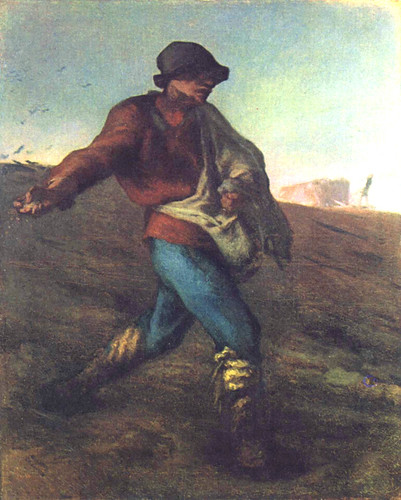 |
| The Sower by Jean-Francois Millet, 1850 |
Jesus’ parable of the sower (Mk. 4:1-20) describes a
.250-hitter who, nevertheless, has a strong RBI total* (to mix metaphors).
He only hits good soil one out of four times—the other three seem to be a miss.
But each hit yields strong results, producing abundant fruit. From the outset
Jesus is describing what would typically be considered failure three out of
four times. Satan, rootlessness, and worldly cares seem to win the day. That’s
the half-empty (or three-fourths empty) way of looking at the glass.
On the other hand, there are at least a couple of things
that make this “failure” a true success. First, the sower. The sower is
faithfully doing what he should do, indiscriminately scattering seed—perhaps generously scattering seed would be more
appropriate. As Wayne Gretzky said (to add another metaphor), “You miss 100% of
the shots you don’t take.” So the sower is taking shots, not knowing where he
might find receptive soil, but sowing nonetheless.
And that’s the other successful aspect of Jesus’ image: the
healthy soil. The seed that finds healthy soil yields fruit in abundance,
including enough seed for much more sowing by other sowers. The fruitfulness becomes exponential.
The harvest is greater than the sower’s meager average. He only connects one
out of four times, but each hit advances others. The harvest doesn’t depend on
the sower. One sows, another waters, but God makes it grow (see 1Cor. 3:5-9).
Jesus seems completely confident in the slow, subtle, seemingly small
advancement of God’s kingdom. And Jesus seems confident in the shared, communal work of God's kingdom. It isn’t about Paul, Apollos, or you or me.
But two things do depend on the sower. One, s/he must sow.
That’s success for the sower—not how much seed finds good soil or even how much
grain is produced, 30- or 60- or 100-fold. Just faithfully sowing—that’s
success. And two, the sower must keep his/her own soil healthy. The word in the
sower’s soul can also be robbed, withered, or choked, and end up fruitless. And one
of the surest ways for this to happen is for the sower to start worrying about
his/her average. To paraphrase Nike: JUST SOW IT!
*Admittedly, the value of such a player in baseball is debatable, but serves the point here.

